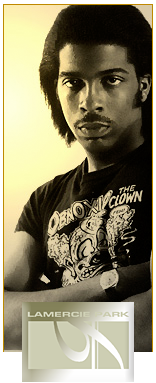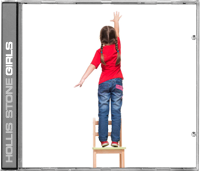
Desperado
In 1985 I decided to dedicate myself to Christian evangelism and
pitched a new project to the new pastor of Bethel Gospel
Tabernacle. He endorsed the idea, and I went out and organized
the second incarnation of the New Witness band. New Witness II
included Dinky Bingham, whom I was lucky to have. Dinky was in
huge demand everywhere, but I may have won him over with the
cause of Christ and all of that. Derek Burch, my pal and the guy
you could always count on, came along to play guitar, and Steve
(whose last name escapes me) joined to play drums. Patrice,
Dinky’s girlfriend, sang with Dinky and myself, and a guy whose
name completely escapes me came aboard as bassist but quit soon
thereafter. I brought in William, who really wasn’t prepared to
be in a band where I was the leader, so William moved on. Left
high and dry, I reached out to Qabid Hakim, then a teenage bass
phenom, for the bass chores. Qabid, whose brother Omar had
reached fame as Weather Report’s drummer, was an excellent
bassist but he was also a Muslim which gave Church Folk pause
whenever I introduced him. I’d known Qabid since he was an
obnoxious, arrogant 14 year-old I’d met while briefly playing
alto sax in Paul "Lucky" McCargo’s combination funk band/street
gang (long story). Tina McCargo, Lucky's little sister, was my
first kiss, behind a neighbor's garage as I recall. Tina,
wherever you are, I should have married you.
I abandoned New Witness II after our first performance. Dinky
talked me out of playing
Desperado, the song included here, at Bethel because he
said, “The Church Folks will kill us.” The gig at Bethel was
meant to rally the troops behind our outreach effort, and the
pastor and youth pastor were supposed to meet with us after the
service to coordinate their outreach teams and so forth. But the
youth pastor left early and the pastor ignored us. I felt
betrayed and clotheslined by the church, lost all heart and, for
years, all confidence in the church as an institution. I never
called another rehearsal, and ignored the band’s phone calls,
doing inestimable damage to those relationships.
Later that summer, my friend Steve was getting married and asked
me to perform at his wedding. Rather than go back to New Witness
II, whom I’m sure wouldn’t even speak to me, I had Qabid
assemble some of his studio buddies, which included Miles Davis
sidemen Steve Horton on guitar and Michael Campeni on drums,
Kaleb James on keys along with Qabid on bass.
At the last minute, Steve’s father refused to allow us to play
the wedding, insisting on an Amy Grant clone singing You
Light Up My Life off of a cassette backing track. I was out a lot of money for the band and a lot
of time rehearsing them, so I decided to make a tape of the
songs and present the songs as a present to Steve and his wife.
I booked time at Matrix in Bayside, Queens.
We were going to record live to two, which means there was no
mixing, no overdubs and no chance to fix anything that might go
wrong. What did go wrong was the engineer had a death in the
family and canceled our first session. Kaleb could not make the
second session, so Qab recruited Lesette Wilson, who went on to
produce Phil Collins and Phillip Bailey’s #1 hit Easy Lover,
among many other things. Lesette took the reins and moved things
along on her own. I was thoroughly intimidated by her, but
impressed that Steve and Michael knew her and knew how to take
direction from her. Bullied out of my producer seat, Lesette
really hammered the session together for me.
The engineer inexplicably refused to use Dolby noise reduction
on the tape, running it at 30 ips (inches per second) rather
than the standard 15 to give it a hotter sound. Hot, but still
noisy. I don’t think he used Dolby on the cassette, either,
hence all the hiss on this track.
I nailed
A Mighty Fortress Is Our God but Lesette made me so nervous
I flubbed all over
The Wedding Song
and wince whenever I hear it now.
Derek And His Timex
Derek Burch became a really close friend. He stopped by once,
in 1985, with an old, beat-up reel-to-reel machine he’d found
somewhere and nursed back to life (Derek was really good with
electronic repair). He also had a, I kid you not, Timex drum
machine, one of the earliest non-Linn, non-Oberheim drum
machines. It was really bad. We set up shop in my living room
and recorded Summer of ‘75, my tribute to Lolo, one of my best
friends’ kid sister, whom I once had an inappropriate crush on
(I was 17, she was 13. Heaven forbid). The track was awful, but
Derek and I had fun recording it, tickled by the notion of
recording our own studio tracks at home.
Karen picked up on my giddiness and bought me a 4-track cassette
recorder, the Tascam PortaStudio, for my birthday. I went out
and bought a bass, a red Ibanez. Could I actually play bass? No,
as Aaron Hall (late of Teddy Riley’s group Guy) proved the first
night I brought it to church. Hall borrowed my bass and played
up a storm, then handed it back to me, leaving me sitting there,
dumfounded about what to do with the thing.
I got a Roland TR-707 drum machine, and immediately started
making my demos at home. I had no clue whatsoever what I was
doing, as my bizarre cover of Louie, Louie certainly attests. I
think I covered that song because there was a Louie, Louie
contest on the radio with a cash prize for the best cover. I
didn’t win. Michael came over and did the vocal. The tape, now
14 years old, deteriorated quite a bit, so Michael’s vocals are
unintelligible. Of course, so were the vocals on the original
song.
Here my big influence presented itself in this attempt at the
Minneapolis sound freshly minted by Jimmy Jam and Terry Lewis’
monster track I Didn’t Mean To Turn You On. I tried to copy that
song’s reckless coke-fiend-on-the-Autobahn over-the-top head
banging, but I had not much clue what I was doing.
Love Letter #2
was a song I’d written back in 1977 for a girl named Brenda. She
was in William’s New Witness Band, and I adored her. But she had
a few bats in her belfry; I mean, Brenda was always kind of
unavailable in a really Zen way, but she was really good people
and fun to be around.
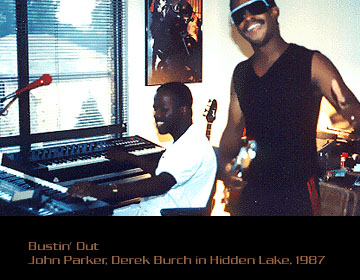 I didn’t really get the hang of the 4-track thing until I moved
into Hidden Lake, a luxury apartment community in North
Brunswick, NJ. Karen and I unofficially broke up in 1986, though
she didn’t move out for nine months after. Some weekends, Derek
Burch and John Parker would come up to the house and work on
some music. John always wanted to work on some music. He was a
very dedicated musician, who thought only of his art, But he was
also a generous musician, who could play my songs as
enthusiastically as his own.
I didn’t really get the hang of the 4-track thing until I moved
into Hidden Lake, a luxury apartment community in North
Brunswick, NJ. Karen and I unofficially broke up in 1986, though
she didn’t move out for nine months after. Some weekends, Derek
Burch and John Parker would come up to the house and work on
some music. John always wanted to work on some music. He was a
very dedicated musician, who thought only of his art, But he was
also a generous musician, who could play my songs as
enthusiastically as his own.
By 1986 Qab was a good friend, and it came to pass one long
weekend, John, Derek, and Qab came over, sleeping on my floor
and sofas, while we cut tracks all weekend on the PortaStudio.
I’d met Glen Alexander in a Rutgers University Chinese
restaurant, where he was playing elaborate New Age stuff out of
cheat books and necromantic box charts. He joined the guys at my
house to do Eddie Van Halen riffs on I Don’t Wanna Be Your
Friend,
Joyce, and Bustin’ Out— tunes that ended up in a demo I
called Girls.
Noisy, unlistenable stuff, I recorded most of this on metal bias
cassettes, which meant High End City. Most of Chapter 2 is
pretty painful, literally, to listen to.
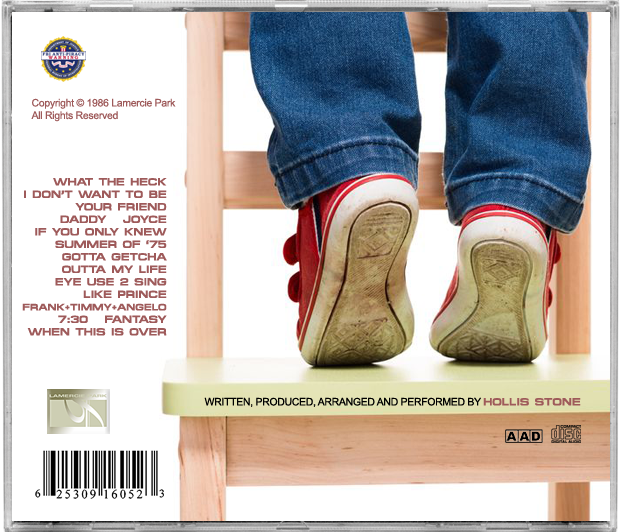
What Girls Are Made Of
What The Heck was me getting into those pretentious “intros” a
lot of bands were starting to do, while borrowing whatever I
could from my heroes, Jimmy Jam and Terry Lewis.
I Don't Wanna
Be Your Friend sprang out of a conversation with Qab. It’s
designed to sound like a riff from The Time, a narcissistic romp
meant to open shows by undermining the fake rapport artists are
supposed to build with their audiences. The most interesting
thing about this track is my Billy Cobham drum track, a very
involved and complex program that took me almost ten hours to
create.
Daddy was my Jam and Lewis take on the song from Streetwise. I
did not recruit Michael to sing it because I didn’t feel like
driving the hour and a half each way to pick him up. The song
has some interesting ideas, but the wretched playing and high
noise make this a really painful experience. The laughable “drum
solo” that grinds everything to a halt doesn’t help much. I do, however, revel in the track’s off-kilter drum
pattern, something I’m certain would have earned me The Look
from Lester. Oddly enough, he liked it when I played it for him.
Yikes, that was the last time I saw him, around 1988 or so. Qabid
literally screamed at me for not letting him play bass on
this. He was right.
Joyce was my one and only dalliance with Country & Western
musical styles. Inspired by my beloved first cousin who lives in
(gotta say it a thick hick accent) Nashville, I fell madly and
completely in love with this woman the moment I laid eyes on her
(I met her for the first time when we were in our 20’s). She
became the standard, the bench mark by which to compare and rate
potential mates. I’ve promised myself if I ever found someone who
was half the woman Joyce was, I’d marry her on the spot. I loved
this track and still do.
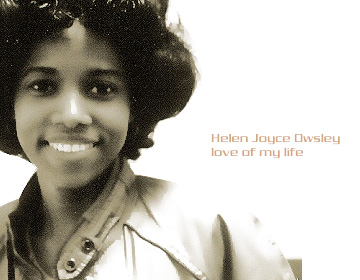 The oddest thing happening here is Qabid, the funkmeister,
grooving with startling ease and serious melodic craft and wit
through the winding labyrinth of this square-dancer. I actually
marveled at how comfortable he was with the tune, never really
giving it a second thought. To Qab, a tune was a tune was a
tune. If Qab liked a tune, he’d play the hell out of it, no
matter who wrote it. He was, in many ways, the Anti-William.
And, while he was at best marginally aware of William, William
disliked Qab intensely.
The oddest thing happening here is Qabid, the funkmeister,
grooving with startling ease and serious melodic craft and wit
through the winding labyrinth of this square-dancer. I actually
marveled at how comfortable he was with the tune, never really
giving it a second thought. To Qab, a tune was a tune was a
tune. If Qab liked a tune, he’d play the hell out of it, no
matter who wrote it. He was, in many ways, the Anti-William.
And, while he was at best marginally aware of William, William
disliked Qab intensely.
John Parker, at the session, was annoyed that I opted to not put
any keys on the track. Joyce is the only tune I’ve ever done
that doesn’t have a keyboard part (until I Know You Don’t
Believe, Yanick’s vignette in Chapter 4).
If You Only Knew marked a brief but ugly period in my life when
I was completely obsessed with Nancy, an old friend from summer
camp. We’d met when I was around 15 and she was 13, skinny and
tomboyish, standing on a knoll outside the camp kitchen, mocking
me while I worked inside as a dishwasher. She was Lucy Van Pelt
to my Charlie Brown, and it wasn’t until we bumped into each
other again as adults that any real attraction presented itself.
Nancy, now an attorney and married mom, had this yes-no, come closer-go away thing
going on. And I, back in my more co-dependent days,
went along with the program.
The most significant thing about the relationship was she didn’t
actually seem to like me. I had long hair and wore freaky
clothes. But, by the time Nancy got done with me, I looked like
an accountant. I became exactly the man she, by design,
invented. And then she got bored and moved on to torture someone
else (2013 Update: Nancy denies this, Your Honor). If You Only Knew was written, essentially, to try and
impress her.
The second version of
Summer Of ‘75 was the more or less official recording of this
whiny tribute to missed opportunity. Of course, Lolo, the flower
of innocence I had such a secret crush on, actually turned out
to have been, at 13, far more experienced than I was at 17.
Maybe more experienced than I am now. The reality of Lolo’s
sophisticated handling of me— her complete sexual and emotional
dominance— was the first and best example of my chronic
isolation from reality. Summer reflected the fantasy of what I
wanted life to be, what I wanted her to be. The reality was.
all around me, people were gently orbiting in a kind of loving
deference to my lunacy and innocence. I was The Man Who Knew
Much Too Little about everyone and everything. Absolutely
everyone in my life was lying to me. Most of them still are.
Gentle lies, for sure. But everyone from my mother and sister to
Lolo and my friends to Nancy The Terrible told me basically what
I wanted to hear. I was like this mentally challenged 12
year-old, beloved by a world of liars.
I finally realized how simple and naive I was, how great a
subject of pity and derision, the night I caught myself stalking
Nancy. Totally in Obsessive Mode, one night I drove the hour and
a half from Hidden Lake to her house in Bayside, sat on the hood
of my car and waited for her to come home. I had champagne
flutes and a bottle of sparkling cider (!) in the trunk. I actually thought I
was being clever, or romantic. But as the hours dragged on, it
finally dawned on me, Nancy is on a DATE. And, worse, You REALLY
don’t want to be here when she gets home. I suddenly
realized I was stalking her. I was one of those guys, the
pathetic Big Bang Theory losers who own official replicas of Star Trek uniforms.
I sped out of there, went home, and wrote
Gotta Getcha Outta My
Life. I mean, she didn’t even like me.
Post Nancy there was Monica The Unbelievably Beautiful Model.
She was one of those tall, lithe, unnaturally thin women with
biologically implausible bustlines and eyes you could lose
yourself in. We became close, but couldn’t quite close the
boyfriend/girlfriend deal because of two things: one, she was so
attractive she’d literally stop traffic. And I became horribly
self-conscious when we’d go places and people would, I am not
lying to you, stop talking when we walked in. Jaws would drop,
and then, the gawkers would stare at me, as if to say, Why is
she with him?!?
The other problem was, like Nola Darling in She’s Gotta Have It,
Monica was seeing three other guys and wasn’t able or willing to
give them up. So we never really made it far as a couple, and I
sneered out
Frank+Timmy+Angelo,
a riff off of Prince's Irresistible Bitch, as a kind of
adios! to that
relationship.
Which led to Yanick, the somber half of the twins who sang on
the first studio projects. Annoyed at Monica, and finally
wanting to be rid of her, I started digging through my black
book looking for Pasha’s phone number. Pasha was Brenda’s sister
(Love Letter #2) and, while Brenda was a question mark,
Pasha seemed to be a bit more accessible I figured it
couldn’t hurt to see what was what. Pasha and Brenda and her
family had moved, though, so I kept flipping in the book until I
stumbled across Yanick’s name. We got back in touch and it was,
for me, love at first sight. She was seeing someone else at
the time, for which I was actually grateful, considering I
didn’t want to be in love with anybody.
But, the fact that I could feel that way about her—about
anybody—left me elated beyond words. It meant I was finally
over Nancy. This realization gave me the
impetus for
Eye Use 2 Sing Like Prince.
seventhirty was a screed at Darlene, my best friend on the
planet. I torpedoed that friendship by asking too much of it.
The song started out as a simple vignette but grew in breadth
and depth over two years, until it became nearly 14 minutes of
screaming at Darlene. The recording proved cathartic, though:
all of my anger at her went into the song, and I sent the song
to her, beginning a long and difficult re-building of that
friendship. The refrain, “7:30,” had meaning only to myself and
Darlene, who suddenly and tragically passed away in 1995.
Fantasy was
inspired by Prince's spinoff group, The Time--a major musical
influence--and the short-lived Mazeratti, both of whom combined funk with metal. I wrote the lyrics as a tease to
Chantee, a friend at work, who was tickled by the tribute.
Fantasy was mono, recorded
on the old PortaStudio on a metal bias tape. Eccch. Glen’s
guitar work is amazing here, though. I really wish I’d done a
better job recording this.
New Strings is just me warming
up for Gotta Getcha Outta My Life. I’d discovered
my little combo keyboard amp had a direct out on it, and I could
play my bass through the preamp and get a much cleaner sound.
When This Is Over was written in loving memory of James Edward
Crockett, Junior, who died of medical negligence at age 1. A
toddler taken in for minor surgery, given a wrong anesthetic
mix, James Jr. slipped into a coma and never woke up. This was James
(from Chapter 1's Mr. Ugly)’ son,
and we all sat vigil with him and his wife for several days.
This was my nephew, my godson. It was a tragedy of inestimable
proportions, and it nearly destroyed us all. This song is taken
from the 61st Psalm, For thou hast been a shelter for me, and a
strong tower from the enemy.
Christopher J. Priest
January 2000 UPDATED OCTOBER 2013
Home | Blog | Projects | Comics | Rants | Music | Video | Christian Site | Contact
Unless otherwise specified, Copyright © 2013 Lamercie Park. All Rights Reserved.
TOP OF PAGE


